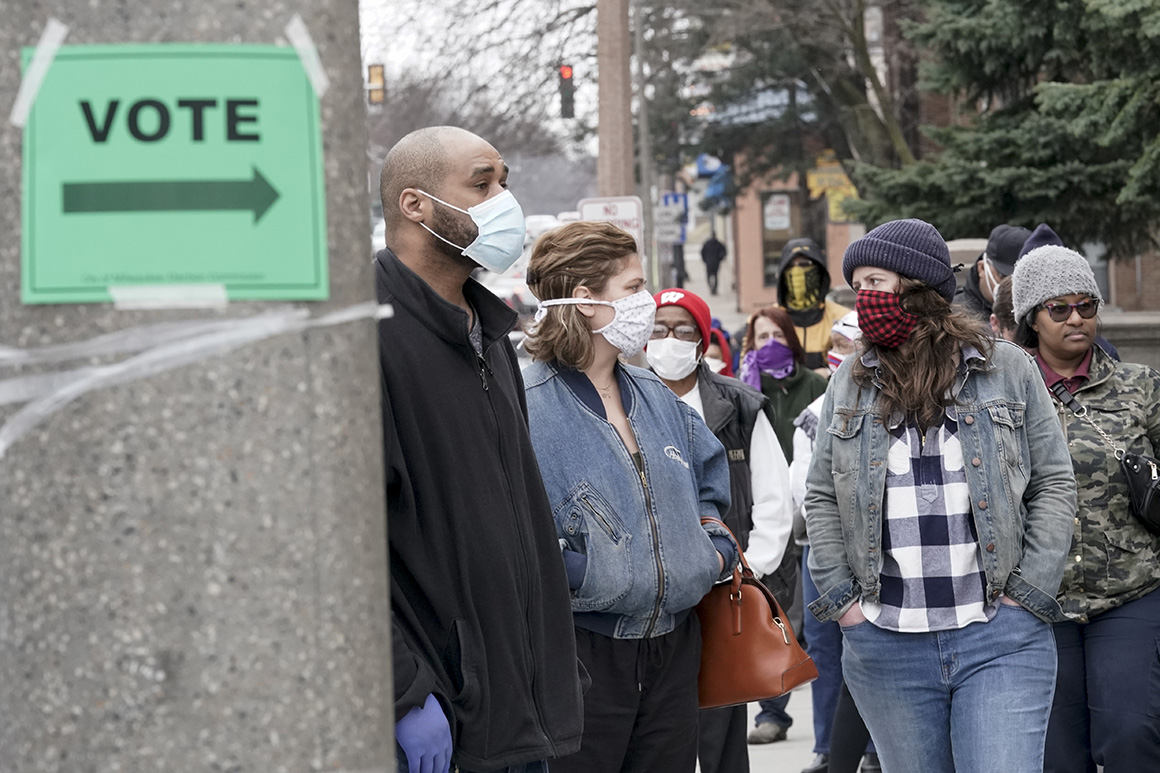
“There is only one major political party in America that wants to create a scenario where there are limited, safe opportunities for people to cast their ballot,” Padilla added. “Trump himself has said it. They are not even hiding it anymore. They are talking about it openly and publicly.”
The clash over ballot access extends beyond which party might have an advantage if laws are changed to make it easier to vote remotely. The unruly scene in Wisconsin, with voters risking their health to cast ballots in person and loads of absentee ballots literally lost in the mail, underscored the danger of the presidential election being viewed as illegitimate if similar problems occur.
Trump’s advisers have said they’re amenable to certain ballot access proposals, such as automatically providing absentee ballot applications to voters age 65 and older, but are opposed to more far-reaching efforts, saying they’re susceptible to corruption. Republicans also warn that a rush to change voting rules across the country could create chaos of its own, which the states are ill-prepared to handle.
“Democrats couldn’t even make a vote counting app work in Iowa and now they suddenly believe they can redesign the entire U.S. election system,” said Justin Clark, senior counsel of Trump’s reelection campaign.
“Their attempt to nationalize our elections through one-size-fits-all federal legislation is irresponsible. History shows that states struggle to implement comprehensive federal election legislation, and their proposal would create more chaos by forcing states into changes that they cannot manage.”
Democrats said the events in Wisconsin provided a snapshot of what they view as the GOP playbook for November: Drive down turnout, underfund the postal system in a bid to make it more difficult to administer a predominantly mail-based election, and delegitimize mail-in balloting.
“Think about what they were willing to do for an election for a Supreme Court seat in Wisconsin. Then ask yourself, what would they be willing to do in November?” said Marc Elias, who is representing the DNC and voting rights groups in dozens of voting access lawsuits. He was referring to claims that Republicans did not want to postpone the primary because doing so might hurt a state court justice up for reelection.
Reeling from the coronavirus outbreak, local officials in Wisconsin could not keep up with mail-in ballots requests and processing. The Republican-controlled Legislature and conservative-led Supreme Court blocked attempts to extend voting deadlines and relax other absentee ballot requirements. As a result, scores of Wisconsin voters went to the polls in person because they did not receive an absentee ballot they requested, according to interviews and reports from public officials.
A day later, a postal service employee reported finding “three large tubs” of requested absentee ballots that were never mailed to voters. Both of Wisconsin’s U.S. senators demanded an investigation.
“They were not able or equipped to handle the number of absentee ballots they received,” Patrick Rodenbush, spokesman for the National Democratic Redistricting Committee, a Democratic-aligned group that works to expand voter access. “If you’re a state election administrator preparing for the fall, you need to be thinking now of how you’re going to deal with early voting and an influx of vote-by-mail.”
To that end, Padilla and other state election officials have convened calls with Pelosi and Democratic leaders to discuss strategy for the next stimulus legislation. Democrats secured just $400 million of the $4 billion they had sought for election assistance in the first relief package.
House Minority Leader Kevin McCarthy (R-Calif.) called the Democrats’ push for more money “disgusting” and a ploy to juice the vote to their advantage.
States fall on a wide spectrum when it comes to ballot access laws, and the battle lines between the parties vary. Roughly half of the 17 states that require an excuse to vote by mail have relaxed them for primary elections.
In contrast to Trump’s stance, Republican officials from West Virginia to Kentucky to Iowa have moved to ease access to mail-in ballots over health concerns from the pandemic. Nebraska Republican Gov. Pete Ricketts last week urged voters to vote by mail in the state’s May 12 election. And voting rights advocates are encouraged that if the virus continues to wreak havoc in the fall, Republicans will do the same then.
In battleground states, however, it’s a different story. Underscoring the trench warfare playing out, court fights are underway in nearly every battleground state.
Source: politico.com
See more here: news365.stream






